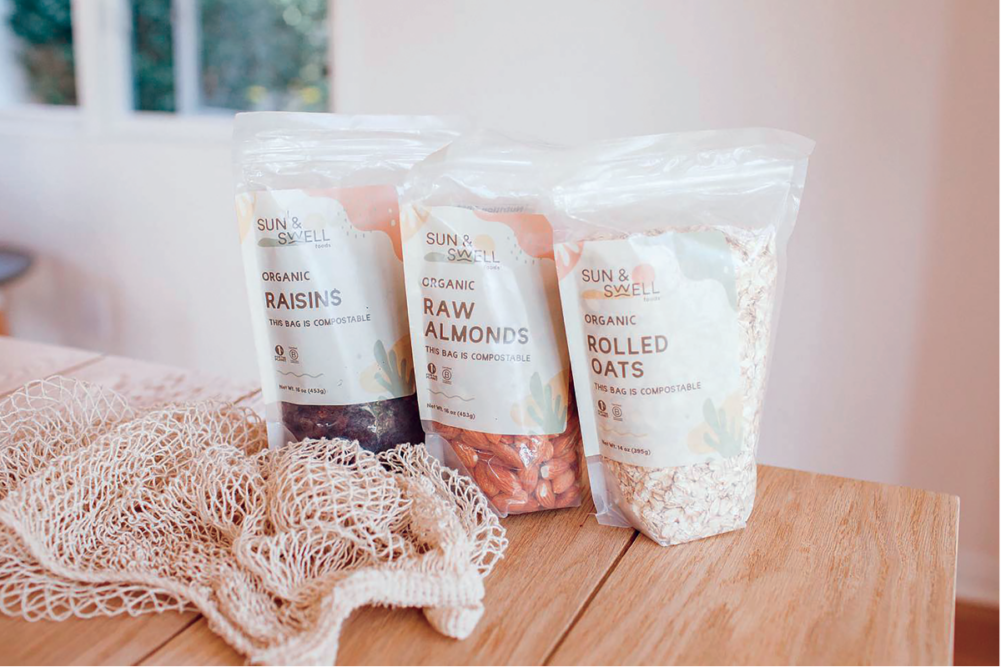SANTA BARBARA, CALIF. — About a year into launching her healthy snacks business, Kate Flynn felt guilty. Her company, Sun & Swell Foods, offers grab-and-go organic bites formulated with fruits and nuts. As her product line gained traction, she began considering the environmental impact of the packaging.
“I realized our company was starting to contribute to this large single-use plastic waste problem,” said Ms. Flynn, founder and chief executive officer of the Santa Barbara, Calif.-based startup. “When you start building your brand, you’re using stock packaging, and then you finally get to the point where you’re big enough and can do this custom order of 50,000 units of printed-on pouches. It showed up, and it was such a bittersweet moment. This is an amazing milestone. We just got our first printed-on packaging, but it was also a pallet of plastic.”
She understood the drawbacks of compostable packaging, namely higher costs and a shorter shelf life. She faced the possibility the product quality may deteriorate when stored in warehouses and on retail shelves for an extended period of time.
Still, a couple years ago, Sun & Swell invested in transitioning to compostable packaging for the snacks, which at the time were mostly sold in grocery stores and coffee shops. The result?
“It totally failed for us,” Ms. Flynn said. “We lost accounts, we lost shelf space, we lost velocity. Our problem wasn’t that the food inside was staling. It was that the packaging itself didn’t look good. The packaging was getting wrinkly; the colors were dull. The layers were coming apart. It just didn’t look good on shelf."
The switch to sustainable packaging ultimately was creating food waste, Ms. Flynn concluded, noting several other brands have encountered a similar setback with sustainable packaging.
“We basically came to the realization that compostable packaging is not ready for wholesale,” Ms. Flynn said. “We switched our business model, and instead of selling grab-and-go snacks in wholesale, we focused on becoming more of a direct-to-consumer online presence.
"We have our own manufacturing facility and warehouse. We can control exactly how long the product sits in the warehouse or goes from our kitchen to a consumer pantry. That’s a situation where compostable packaging works perfectly.”
Over the past year, Sun & Swell has swung largely to online sales and expanded its assortment to include dried fruits, nuts, spices and other pantry staples. Most of the products sold on its website are packed in compostable pouches. Meanwhile, the products it sells to stores, which today represents a much smaller portion of the business, remain in plastic packaging.
Yet another challenge emerged as Sun & Swell shifted toward compostable packaging. Ms. Flynn discovered many consumers lack access to industrial composting facilities and were unable to discard the packaging as intended. So, she recently began piloting a send-back program, allowing consumers to return used packaging in a prepaid mailer so the company may properly compost it. So far, the opportunity has been popular among Sun & Swell consumers, she said. Ms. Flynn hopes to extend the program to accept compostable packaging from other brands, too.
“We do have other brands asking if they can have their customers send us bags, or we have our customers asking us, ‘Hey, I have these other compostable bags. Can I put these in here?’” she said. “Right now, we only take ours because we’ve only tested the timelines with ours. Our goal is to help other brands take responsibility for that end-of-life process as well.”
Looking ahead, Ms. Flynn’s ambitions for pushing the industry toward plastic-free packaging may take shape in several ways. In addition to expanding the send-back program, Ms. Flynn hopes to guide emerging brands through the process and eventually create a marketplace for companies using compostable packaging.
Other food and beverage brands pioneering plastic-free packaging include Numi Organic Tea, which launched plant-based tea wrappers, and Alter Eco, which uses compostable wrappers for chocolate truffles. Snack startup 12 Tides relies on packaging designed to decompose into compost within six months. Mmmly uses compostable sleeves for its soft-baked, grain-free cookies.
“Not every brand can do everything perfectly,” Ms. Flynn said. “You have to pick your battles. That was one of the battles we wanted to pick. Being truthful with what your goals and vision and brand are is really important for people.”




